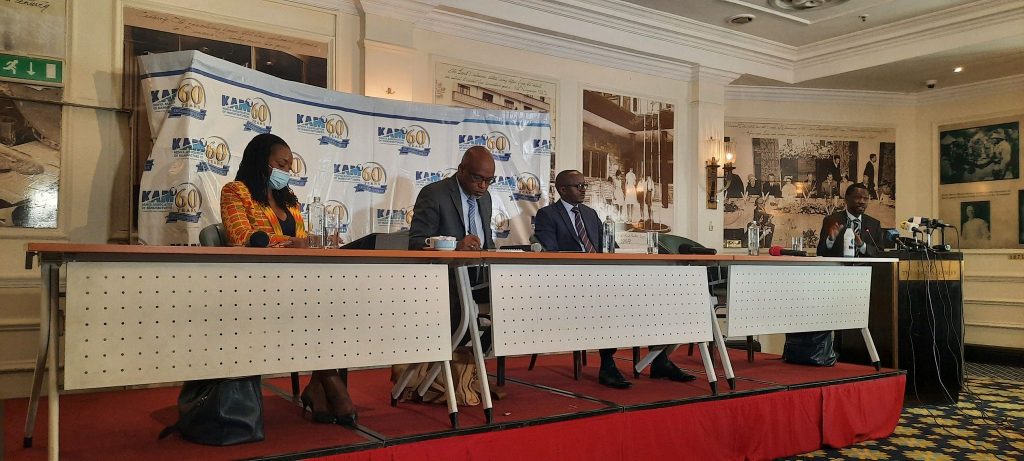Businesses have Decried Kenya’s Heavy Taxation Amidst Pandemic saying it is fuelling illicit from the neighbouring countries.
According to the Chairman of Kenya Association of Manufacturers Mucai Kunyiha, the government shouldn’t be taxing raw materials since the move is dis-incentivising local manufacturing sector and making products expensive
“Kenya should have a predictable tax regime. The huge difference in exercise duty between Kenya and the neighbouring countries is fuelling illegal trade” said Kunyiha.
In the recent past Kenya has witnessed an increase in commodity prices due to an increase in taxation measures.
In a meeting themed ‘Reduce Cost of Living’, businesses expressed concern on the current focus on politics without practical solutions to bring local businesses back on the recovery track.
The businesses raised concerns with the high cost of doing business, amidst the economic challenges brought about by the COVID-19 pandemic.
Kunyiha noted that additional taxes imposed on businesses in addition to inflation adjustment on specific rates of duty have had a severe impact on businesses.

“It is becoming more expensive to operate in Kenya due to the introduction of taxes, fees, levies and charges. For instance, the Crop (Nuts and Oil Crops) Regulations 2020 introduced new fees and levies as a measure to control thirteen (13) scheduled crops. Through the 2021 Finance Act, the government has introduced excise tax on raw materials and 16% VAT on the supply of some products, effectively increasing the cost of doing business and final consumer prices,” he said.
“In addition, the government has also proposed a 4.97% inflation adjustment on specific rates of duty, which is set to have an impact on consumers, manufacturers and negate gains made in the fight against illicit trade.”
Kunyiha observed that the government needs to understand that the introduction of such measures is counterproductive and has acute consequences across all sectors of the economy.
“The new tax measures are punitive and are in contradiction of the ‘’Do No Harm’ approach to local businesses on the recovery track. The unpredictable fiscal and regulatory policies significantly threaten the Made in Kenya goal and give an upper hand to cheaper imports from other countries. To worsen an already dire situation, last week, Parliament rejected the Public Procurement and Asset Disposal (Amendment) (No. 3) Bill that proposed to amend the Principal Act, further negating efforts to enhance local production and competitiveness, and consequently, the Buy Kenya Build Kenya goal.”
Institute of Economic Affairs (IEA) CEO, Kwame Owino, reiterated the importance of a thriving private sector, saying, “If private sector growth fails to happen, then economic development shall remain stunted because of the numerous taxes they have to pay. Africa needs to focus on long-term prosperity, as opposed to short term ambitious revenue collection targets. As a country, it is critical that we stop gauging our revenue authority’s performance and efficiency, based on their record-breaking rates of tax collection.”
Micro, Small and Medium Enterprises (MSME) Alliance of Kenya CEO, Samuel Karanja called on the government to do away with archaic regulations, that hinder SME growth, adding “Currently, we have 7.4M MSMEs in Kenya, but only 1.56M are licensed. We urgently need to formalize the cottage industries. This calls for the creation of a conducive business environment, to increase MSMEs competitiveness and productivity. The government can do this through informed and effective policies.”


